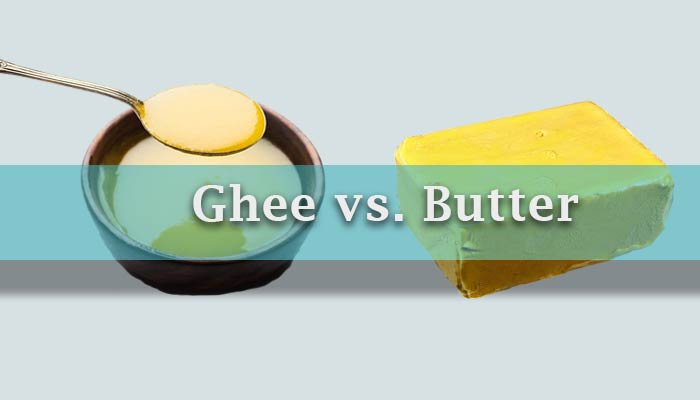by Daisy Dao
Dairy products have become more of a necessity than a basic ingredient in our day-to-day meals. They are key ingredients to some of the most delicious recipes ever created. For most of us, living without them is absolutely impossible. From cakes to ice creams, numerous products consist of one or other form of milk.
Likewise, ghee and butter are two of the most widely used dairy products. They are filled with saturated fats that instantly liven up our taste buds. It's hard to differentiate between these two as they have similar applications. However, certain factors show the subtle differences between them.
Contents

To understand the differences between ghee and butter, you first need to realize how each of them can benefit your health
If you ever cooked with ghee, you probably noticed how intoxicating its smell is. Just a whiff of that magical aroma is enough to make your mouth water. This is because ghee heated for much longer than regular butter, which gives them a nuttier flavor.
It also becomes denser and shows a darker hue. The intense aroma allows you to cook the most tempting dishes that will keep everyone licking their fingers.
Recent studies have shown that regular intake of ghee significantly reduces the chances of coronary diseases. It successfully reduces the accumulation of bad cholesterol in your blood. Bad cholesterol can usually block your arteries, which eventually causes cardiac arrest.
Not only does ghee reduce bad cholesterol, but it also increases the production of good cholesterol in your bloodstream. This leads to healthy blood circulation and an even healthier heart.
Even though it mainly contains fat, ghee can be highly effective at strengthening your immune system. It contains generous amounts of vitamins such as A, D, E and K. The fat-soluble vitamins if taken regularly, can gradually boost your resistance to several diseases.
Apart from that, ghee contains antioxidants that can also prevent infections and other types of diseases. It can also protect your body from certain allergic reactions.
Among other things, ghee acts as a catalyst for the body's digestive enzymes. Unlike other types of fat that are hard to break down, it actually stimulates the stomach to secrete more digestive juices. This helps the body break down the ingested food more efficiently, and get all the necessary nutrients faster.
This is particularly helpful for those who are trying to lose weight. Ghee can improve your body's metabolism rate. You will notice visible changes to your body once you add it to your balanced diet.
Due to the intricate production process, ghee doesn't consist of most of the milk proteins present in butter. It contains minimal levels of casein (a dairy protein) and lactose. This is why it's a suitable dairy product for lactose intolerant people that's both delicious and healthy.
Although ghee is a healthy source of vitamins and antioxidants, it also comes with a few disadvantages. If consumed in large amounts, it can harm your body in more ways than one.
You might already know that there's no lack of fat in either ghee or butter. Regardless of the health benefits, ghee shouldn't be consumed in massive amounts. It contains loads of calories which does give extra energy, but can also cause obesity.
A large amount of calorie intake regularly causes you to put on some extra pounds. So, if you're planning on staying in shape, you better not succumb to its temptation more than once a day. Even then it's recommended to eat ghee in moderate amounts to reap the benefits without risking cardiac arrest.
Ghee contains a high level of butyrate content that increases the body's metabolism to a certain extent. When consumes in excessive amounts, the butyrate content can make your digestive system faster than your body can handle.
Yes, it does help prevent heart diseases but only when it's taken in small amounts regularly. Overindulging yourself with ghee can have severe side effects on your body leading to blockage of the artery. This can also raise the bad cholesterol level in your blood, and increase blood sugar for diabetes patients.
The best thing about butter is that you can add it to any recipe to immediately enhance its taste, but that's not all it does. Butter contains countless nutrients that are beneficial for different parts of your body.
Butter contains moderate levels of vitamins A, D, E, and K. It has a large amount of vitamin A in the most easily absorbable form. The vitamin is particularly helpful for keeping your thyroid and adrenal glands healthy.
Vitamin D is also abundantly present in butter. This is necessary for the bones to efficiently absorb calcium. It allows your body to keep your bones strong and repair any internal damage quicker.
It's also a rich source of the mineral selenium, which is a vital nutrient for maintaining a sturdy bone structure. Apart from that, it contains a chemical called Activator X, which improves the body's ability to absorb minerals. Butter also provides you with a highly absorbable form of iodine.
The most essential nutrient in butter is a form of conjugated linoleic acid. This is a powerful anti-cancer agent that's usually found in dairy products such as butter. Not only does it help prevent cancer but it also acts as a muscle builder. It even contains antioxidants that can help boost your immune system.
Furthermore, butter contains saturated fats that can help you against tumors and cancer (if consumed in small amounts).
Butter is specifically an important part of the diet for infants and the elderly. Old people often suffer from calcification of joints which can be eased by eating butter. It is the sole source of the anti-stiffness factor that keeps the joints intact. This factor can also restrict the hardening of arteries and cataracts.
Most people refuse to include butter in their diet due to their high cholesterol levels. However, cholesterol can be highly advantageous for infants. The butterfat is vital for the development of their brain and nervous system. Butter can also protect both infants and the elderly from gastrointestinal infections.
Regardless of the different ways butter can help you stay healthy, it also has a few disadvantages.
As you may already know, butterfat has a very high smoke point. It means that fat can withstand very high temperatures without burning. Unfortunately, fat isn't all that butter consists of. Unlike ghee, it also contains dairy sugars and proteins that burn easily.
Therefore, it's not ideal to use butter for recipes that require cooking at high temperatures. If you choose to do so, the milk solids will turn brown faster than the butterfat melts.
Butter is completely forbidden for those suffering from lactose intolerance. It contains sugar and protein solids that can cause severe allergic reactions when consume if you have any milk protein allergies. On the other hand, ghee has a lower concentration of sugar and protein.
Butter is a form of pure fat that contains numerous chains of saturated fatty acids. Lauric acid (a form of saturated fat) is often present in real butter. This type of fats can increase the LDL-C levels in your body. LDL-C is the bad cholesterol that causes blockage of arteries and other heart-related troubles.
Both of these dairy products have limitless culinary use and can give your dishes panache. Their ability to make any bland dish stand out on its own is undeniable. Nevertheless, consuming either butter or ghee excessively can cause severe health problems in the long run.
Ghee has a higher smoke point than butter. Hence, the food you're cooking will determine which of the dairy products you should use. Butter is highly beneficial for bone structure and brain development. So, if you're cooking for a toddler you might prefer the latter.
Accordingly, lactose-intolerant people should avoid butter as much as they can. Ghee is a much safer option for them. A few tablespoons of ghee or butter are enough to give you that extra boost to get through the day.
If you have no major heart conditions, a controlled diet that includes a moderate amount of either of the two saturated fats will allow you to stay fit and healthy.]
It's pretty challenging to choose between two ingredients that are the base of so many scrumptious recipes. However, each person has their own preferences. Try to be cautious about how much ghee or butter you're eating daily. Just a little bit too much can gain you a few pounds or even worse, and cost you your life.
 |
 |
 |
 |
 |
 |
 |
 |

About Daisy Dao
Daisy grew up on the beautiful Honolulu island where she often found herself spending most of her day enjoying the ocean scent in sea waves. As such, Daisy came to appreciate the art of cooking seafood. She has experimented with baking, roasting, broiling, poaching, grilling (and every other cooking technique you can think of); and with all kinds of spices too. Now she is ready to present her experience: the art of cooking healthy food without any pre-packaged ingredients; food product recommendations for people who need a bit more guidance on what goes into their bodies; how to maintain an active lifestyle without having to give up your favorite foods!